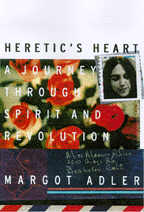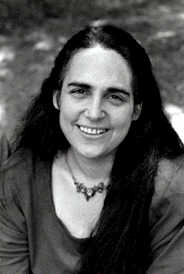

an excerpt from
Heretic's Heart
by
Margot Adler
Margot Adler founded Hour of the Wolf in 1972, broadcasting her unique blend of live radio weekdays from 5-7 AM. This excerpt (publshed by permission of the author) from her just-released memoir, Heretic's Heart, tells of that time.
Click here to order Heretic's Heart from Amazon.com
My religious and political confusion had permeated my working life. Iíd become sick of journalism, of reporting what the columnist Russell Baker dismissed as "olds": cops, tornadoes, disasters, crimes, political upheavals, wars. Like Baker, I sought "news": archeological finds, scientific discoveries, things we might actually care about in a hundred years or more. I desperately searched for the longer view, them ore eternal. And I began to find it, through radio in the early morning hours -- the most magical time of day.

It is 5 a.m. at the radio station: I am sitting in almost total darkness watching the dials in my solitary rocketship. It is easiest to invoke the dream state in this darkness that mimics the starry night, where instead of the points of light from planets and stars, the lights are the buttons and dials of this radio studio where I sit alone, the captain and engineer of this ship that makes a two-hour journey every morning, starting at 5:00 a.m. My rocket is named Hour of the Wolf, and just like the Enterprise, its mission is to explore new worlds. And in sadder, more reflective moments, I think that despite the moon landing and the hopes it raised, this is the closest I will get to the other planets in my lifetime.
The early hours of the morning, when most people are asleep and few are listening, and those that are awake may still be half in dream and reverie, allow conversations that would never even begin later in the day. During these hours people are willing to reveal their deepest hopes and fears in a state of innocence. The radio can allow imagination and fantasy to soar, perhaps by encouraging the same intimacy -- imagined or real -- that Marc and I created in those letters that crossed from Berkeley to Vietnam and back. The thing about radio, as Tony Schwartz, the public relations genius, once said, is that "people were born without ear lids." Unlike television pictures, sound flows all around us, and the flood of images that come to us from those sounds is, in large part, our own creation.

Today we live in a world of strident talk shows, where received opinions on the state of the world are trumpeted back and forth, and anyone who might dare to unfurl a hope is quickly put down. But at WBAI-FM in the early 1970s, a period of wild and wonderful experimentation in free-form radio was taking place. Pioneers like Bob Fass, Steve Post, Larry Josephson, Liza Cowan, and others could open the phone lines and just let people talk, never screening a single call.
Iíve been given this two-hour show because no one else is using it. I donít yet have the chutzpah to ask for anything better, but here I am free to try my hand, while I live on an unemployment check of thirty-two dollars a week. If the showís a success, WBAI will hire me back.
At five in the morning there is nothing that cannot be changed. Mostly there are questions and feelings and yearnings. Anything can happen. A story is read on the air, an interview is conducted. The phone lines are opened and anyone can turn the world upside down or at least change the shipís course.
A cab driver begins a show by calling in to talk about the day that passed. A science fiction story prompts a discussion on utopian and dystopian ideas. A woman reads a document called "The Asexual Manifesto" on the air, and calls from the solitary and celibate follow for days. I tell about my experiences with group sex, and another week of intimate conversation begins. Or I close my eyes and speak into the ether about my ambivalence about having children -- my fear that I will be trapped in a system that I have always avoided; that my need to be accepted will triumph over my need for freedom; that I will be transformed into a Stepford wife; that having been an only child, I havenít learned how to take care of a child. The letters pour in; I read them on the air and the talk continues. Women call up with babies wailing in the background; some talk of the unexpected wonder of their children, the joy of participating in life and community, while others dare to ponder if they have made a huge mistake.
Over the course of three weeks, a friend and I read Ecotopia, Ernst Callenbachís underground classic, over the air.
How many people are listening? Certainly thousands, certainly not hundreds of thousands, but the depth and intimacy of response is larger than one can calculate. I still have boxes of letters, multi-paged, single-spaced outpourings. Now, in the 1990s, several million people may listen to one of my reports on All Things Considered and I might not receive a single response. But in the 1970s, on that 5:00 a.m. show, it was possible to create a community of seekers.

I play with the occult; I invite palmists and astrologers to enter my spaceship. I remain a skeptic, although an astrologer tells me I will write a book before I am forty, and I do, and a palmist tells me my parents separated around age eleven, which they did. Psychics and healers enter my dark and starry studio. So do psychologists and anthropologists. Those on the edge of science come into my rocket ship -- the creators of holograms, people who talk to plants, those who say they can photograph auras. I watch the psychic Yuri Geller read my mind as he sits beside me. Is he a fraud? Or does he augment his genuine talent by sometimes cheating? Iím suspicious of all systems, refuse all gurus, but believe that, at bottom, we are so much more than we think. I believe that Australian aborigines can smell water, so why shouldnít a psychic occasionally be able to read my mind? I do believe that all religious and magical systems contain a kernel of some ancient knowledge, usually encoded in an unacceptably authoritarian system.
The old Marxist inside me warns that all this religion stuff is an opiate, an oppressor. Sometimes it is. But I also know that religion means to "re-link" and that meditation and ritual allow me to enter timelessness and to encounter the real mysteries of birth, life, death and regeneration. A teacher of "Mind Dynamics" tells me that "the little child who got napalmed in Vietnam didnít have to be there if she didnít want to." "Boy," I rage, "these occult philosophies do let the anxious middle class feel secure with their privilege." I am desperate to understand the divide: where is spirituality liberating, where is it oppressive?
Science fiction provides a structure for my wanderings, and the writers troop into my cabin -- Peter Beagle, Ursula LeGuin, Joanna Russ, Norman Spinrad, Samuel Delany, Robert Anton Wilson, and countless others. In the late twentieth century, theirs is the only literature of ideas we have. Dismissed as "genre fiction" while the literati spend hours reading books that do nothing more than chronicle failing relationships, science fiction explores everything from telepathy to politics. Nothing is taken for granted. Society, love, and work, even gender, are remade. There are anarchist and capitalist utopias, and worlds in which human beings travel faster than the speed of light, sport wings, and experiment with their own genetic engineering. There is always further, as the old sixties slogan said.
Feminism, from politics to sexuality, is also part of my world, and ecology and green politics and critiques of technology that say, Hold on! -- you canít remake everything without destroying the earth! Theodore Roszak and Murray Bookchin make their appearance.
Amidst this explosion of variety in the early morning hours, is there any order? Very few things seem evil, except apathy. That which aids potential is good, that which limits it is evil. Creative order is good, as is creative disorder, as Robert Anton Wilson once said. Destructive order and destructive disorder are bad.

e-mail your comments to Margot Adler

 Read more about or purchase Heretic's Heart from Amazon.com
Read more about or purchase Heretic's Heart from Amazon.com
Go to Beacon Press' website for information about this book
Read about or purchase Drawing Down the Moon
Read Margot Adler's backgrounder on the NPR Web site
Go to the Hour of the Wolf table of contents
More about Hour of the Wolf on WBAI
Read more about or purchase Heretic's Heart from Amazon.com




